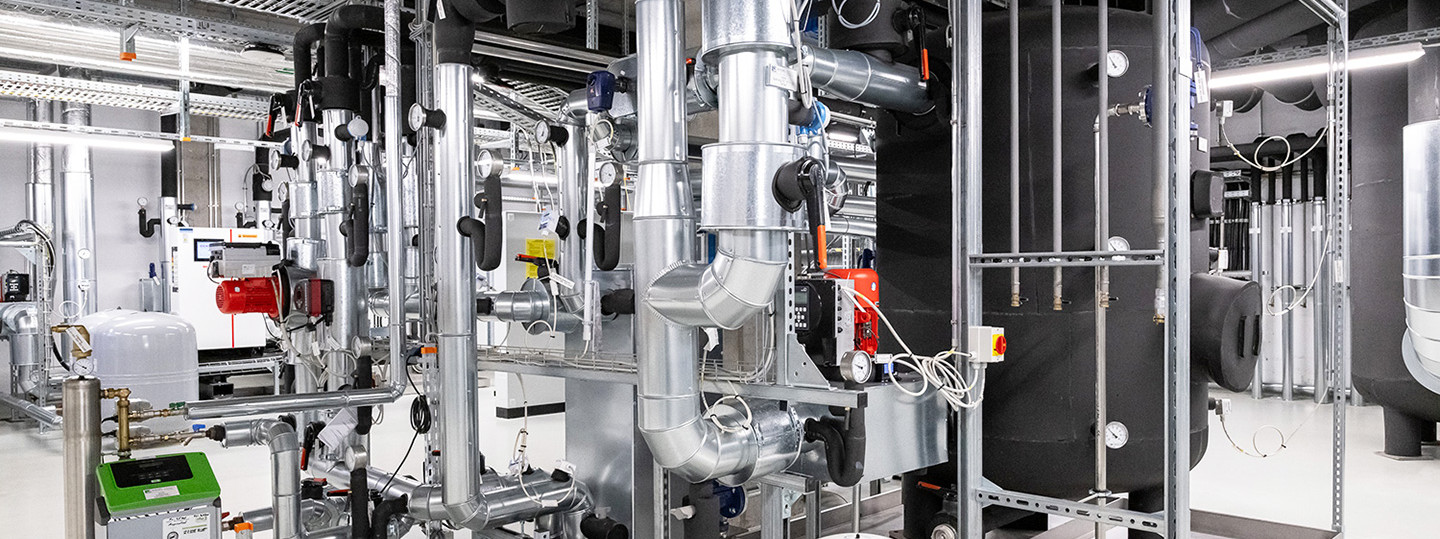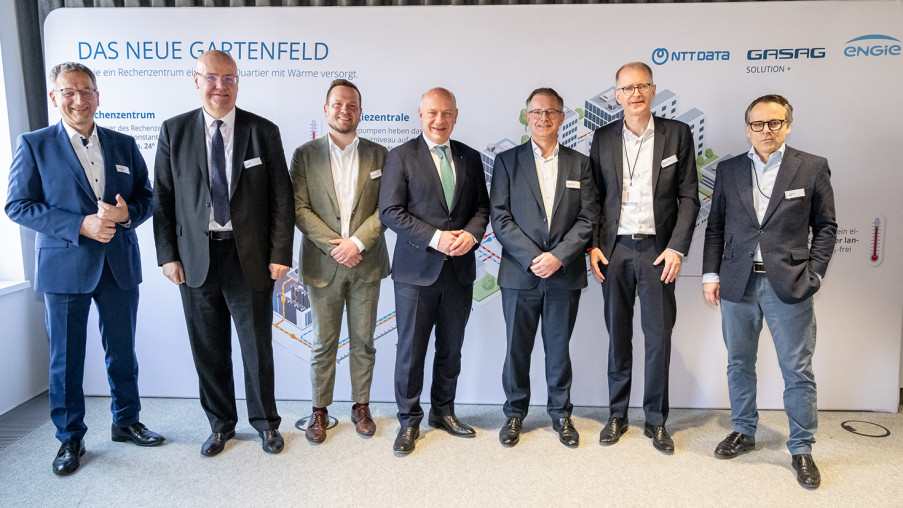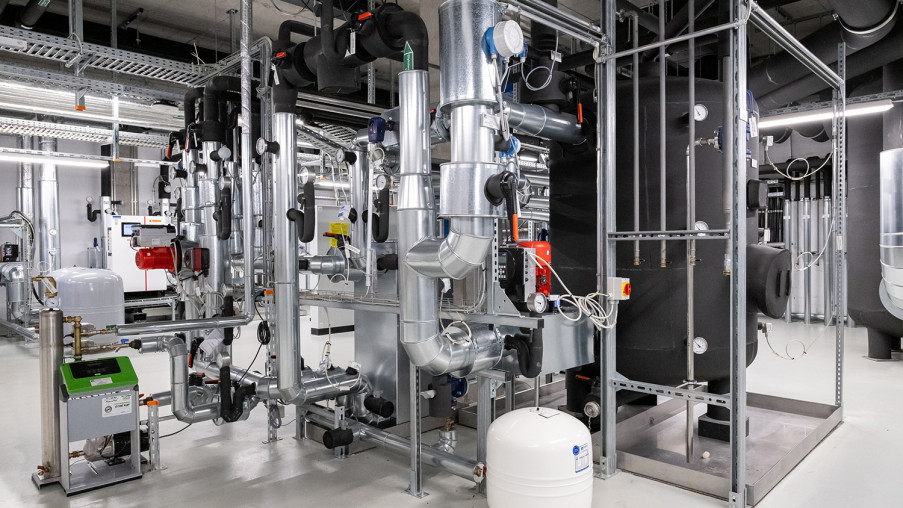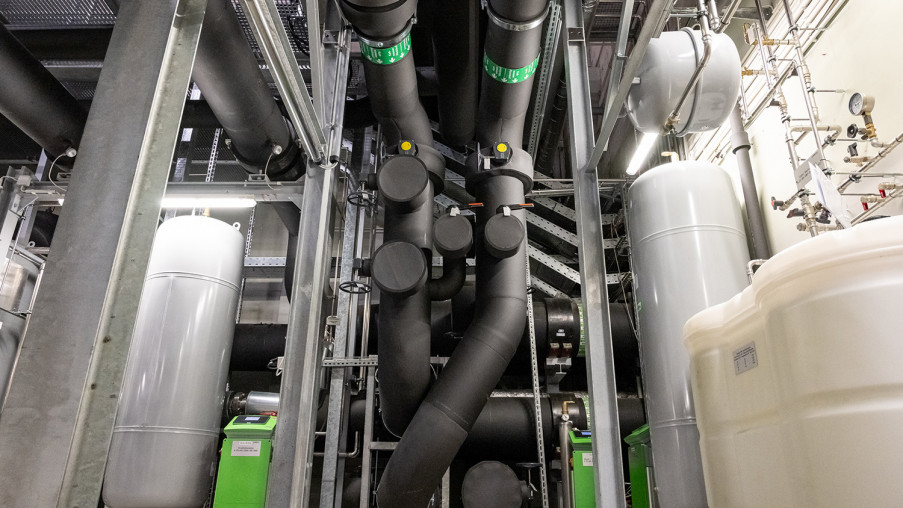
Waste heat from NTT DATA's existing data center enables climate-friendly heating concept in new Berlin district
Spandau data centers reliably supply more than 10,000 people with CO2-free heat.
Hattersheim/Berlin - At the Berlin 1 data center site of Global Data Centers, a division of NTT DATA, the go-ahead has been given for a pioneering heating concept in the "Das Neue Gartenfeld" development area: Up to 8 MW of heating power will be provided from the two data centers in Spandau for the project with Quartierswerk Gartenfeld GmbH, a joint venture between ENGIE Deutschland and GASAG Solution Plus. The partners celebrated the recent signing of the contract at a reception on April 2, 2025 in the presence of the Governing Mayor of Berlin, Kai Wegner, and high-ranking representatives from politics and business.
"Das Neue Gartenfeld" is a 31-hectare development area in Berlin-Spandau, where 4,500 apartments, 200 commercial units as well as daycare centers and schools for more than 10,000 people will be built. The heat required for the new district will be produced in its own energy center and fed into a district-wide local heating network. The energy center of the Quartierswerk on the Gartenfeld site will receive CO2-free waste heat from NTT DATA's Spandau data centers via an approx. 2 km long pipeline. The waste heat generated during the operation of IT systems in the data centers has a temperature of 20 to 30 degrees Celsius, regardless of the weather or seasons. It therefore provides an optimum and reliable heat level for heat pumps in order to generate the flow temperature of 65 degrees Celsius required for the local heating network. Based on the waste heat that can realistically be expected, the provision of thermal output was set at a maximum of 8 MW.
Konstantin Hartmann, Managing Director EMEA at Global Data Centers, is convinced: "When planning new data centers, the use of waste heat is usually already taken into account. However, solutions for existing data centers are rare. NTT has been using waste heat for years to heat its own offices or to preheat emergency power generators, and this is also rare. We worked with all parties involved to find the most technically and economically suitable solutions and have now agreed on them. Together with our project partners, we are currently implementing what is probably the largest project for waste heat recovery from existing data centers. We are demonstrating that CO2-free waste heat with a temperature level of 20 to 30 degrees Celsius from existing data centers can be used sustainably and efficiently for a large district."
A power-to-heat boiler with an output of 3.6 MW will also be installed to cover temporary peak loads in winter. The energy center also contains a hot water tank with a capacity of 300 cubic meters. Construction of the energy center will start at the end of 2025. By the end of 2026, the district's local heat supply will be provided by the waste heat from the data centers.
Niklas Wiegand, Managing Director of ENGIE Deutschland, emphasizes: "Sustainability and future security are very important to us at ENGIE Deutschland for our customers. After examining several options, we opted for a decentralized heat supply that integrates an existing heat source. By using the thermal energy from the NTT DATA data center, we save around 6,000 tons of CO2 per year and supply the district with heat independently."
Matthias Trunk, GASAG Board Member for Sales, adds: "The constructive cooperation of all those involved characterizes this technically demanding project. The ability to partner is a decisive success factor in this project. We are also happy to contribute our experience with the use of waste heat from data centers to this innovative and future-oriented solution. This major district project will once again contribute to Berlin's heat transition."
Kai Wegner, Governing Mayor of Berlin: "We need to make Berlin climate-friendly, resilient and future-proof for the next generations. The Berlin Senate is already working on this with its partners from industry such as GASAG with full commitment and innovative concepts. "Das Neue Gartenfeld" is a showcase project - and a successful example of how the heating transition can succeed: with an energy supply that integrates various local energy sources."
From left to right: Günter Eggers (Director Public, NTT Global Data Centers EMEA GmbH), Eric Stab (CEO ENGIE Deutschland AG), Konstantin Hartmann (NTT), Kai Wegner (Governing Mayor of Berlin), Niklas Wiegand (Managing Director ENGIE Deutschland GmbH), Georg Friedrichs (CEO GASAG), Leif Christian (Cropp)
Your contact
ENGIE Deutschland GmbH


